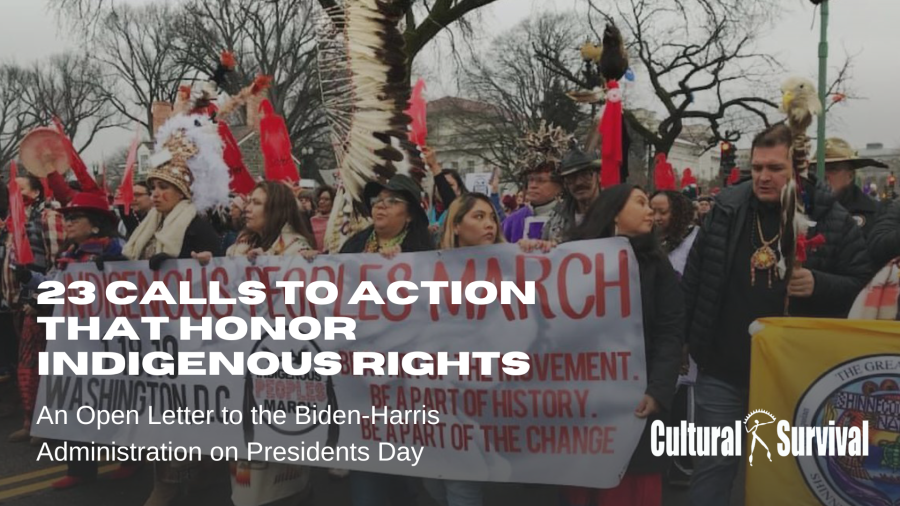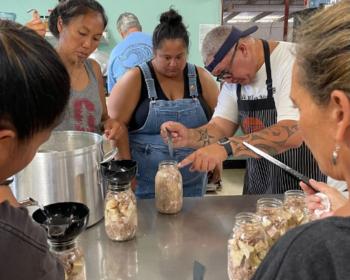
In April 2025, Cultural Survival submitted a stakeholder report to the Human Rights Council for the Universal Periodic Review (UPR) of the United States. The report highlights instances where the U.S. has not complied with the rights of Indigenous Peoples. Despite the report not being exhaustive, it addresses the ongoing systemic injustices that Indigenous nations live day by day as a legacy of colonization, such as land dispossession, environmental destruction, and cultural erasure. Although, the U.S. announced its support to the UN Declaration on the Rights of Indigenous Peoples (UNDRIP) in 2011, today’s landscape reflects a concerning increase in the violation of human and collective rights like self-determination, Free, Prior and Informed Consent regarding land and cultural rights and freedom of religion, and gender-based violence against Indigenous Women, Girls and Two Spirit (MMIWG2S+) individuals. The current Trump administration has enacted executive actions that diminish Indigenous sovereignty and rights, thereby jeopardizing the survival, dignity, and future of Indigenous Peoples within the nation.
The United States of America, encompassing Alaska and Hawai’i, recognizes 574 Tribes at the federal level, and also comprises another 400 that are not federally recognized. This means the State is obliged to have a government-to-government relationship with only the recognized first Tribal Nations, leaving behind the non-recognized ones. 2.9% of the total population of the country identified as American Indian or Alaska Native according to the 2020 census, with at least a quarter of them living on reservations or trust lands. They have also been dispossessed of over 99.8% of their homelands.
The government persistently violates and inadequately safeguards the rights of Indigenous Peoples concerning self-determination, cultural heritage, lands, and languages, among others. Furthermore, the US repeatedly violates its treaties with Tribal Nations, which hold the highest legal standing. Recent executive orders, budget, and federal workforce reductions under President Trump pose a threat to the continued operation of 25 regional Bureau of Indian Affairs offices, funding for the Indian Health Service, and programs administered by the Bureau of Indian Education.
The U.S. has supported recommendations concerning Indigenous Peoples in past Universal Periodic Review cycles. However, the implementation of these has been unsatisfactory, especially the ones concerning:
The improvement of the access to education of American Indian and Alaskan native students; the respect to the right of consultation, language and others with the correction of historical injustices and fair compensation; the support to their rights to traditionally owned lands and resources and ensure the protection of sacred areas against environmental exploitation and degradation; the implementation of UNDRIP; the reporting of violence against Indigenous women, especially sexual violence and rape, bringing perpetrators to justice; and the implementation of concrete measures that align with the Covenant on Civil and Political Rights, ensuring the participation of Indigenous Peoples in decision making involving their territories and social, cultural and spiritual practices.
Some of the examples of the ongoing rights violations of Indigenous Peoples in the country that this report comprises relate to land rights, self determination and FPIC; gender rights; and self determination and FPIC.
- Land Rights, Self-determination and FPIC: the case of the Oak Flat
The Oak Flat, or Chi’chil Bildagoteel is a sacred site of the San Carlos Apache Tribal Nation in the Tonto National Forest, Arizona. It has been the homeland of the Apache People and other Indigenous Peoples since immemorial times, and a place of utmost cultural and spiritual importance. In 2014, the government authorized the transfer of this federal land to the Resolution Copper Company without consulting the Tribal Nations, which would allow the site’s transformation into a two-mile-wide copper mine.
In January 2021, the Apache Stronghold coalition (a group of traditional Apache and other Native and non-Native allies) filed Apache Stronghold v. the United States, arguing that transferring and destroying Oak Flat violated the Religious Freedom Restoration Act and the Apaches' rights to religious freedom, due process, and remedy, as well as a breach of trust and fiduciary duties. Despite numerous rejections of their requests, continued legal challenges seemed to improve when a federal district court in Arizona decided to pause the U.S. government’s plans to move forward with the extractive project in early May 2025. This temporary halt ensures the land transfer is postponed until the Supreme Court decides whether to review the case concerning the land.
- Gender Rights
Another case the U.S. government is failing to address is the one related to gender-based violence. Even though violence against Indigenous women, girls, and Two-Spirit people is still heavily underreported, alarming data shows that there is a significantly differentiated level of violence that Indigenous women and girls face, compared to white women. In 2020, American Indian and Alaska Native women had the second-highest homicide rate. Over 5,800 were reported missing in 2023, 74% of whom were children. Another study found that lesbian, gay, bisexual, transgender, and Two-Spirit Indigenous individuals were more likely to experience childhood physical abuse compared to their heterosexual counterparts.
The Missing and Murdered Indigenous Women, Girls, and Two-Spirit (MMIWG2S+) movements in the U.S. and Canada have put the spotlight on these gender-based violence cases, centering the extractive industries as a correlational issue. The interrelation between "man camps" near Indigenous communities and increased violence, compounded by existing vulnerabilities and limited access to justice, results in sexual, physical, mental, and other violence against Indigenous women and Two-Spirit people, violating their rights to integrity, liberty, and security.
Despite successes such as the enforcement of Savanna’s Act (S.227), which clarifies the government’s duty to enhance data collection in cases of missing and murdered Native Americans, and the Not Invisible Act (S. 982) aimed at combating violence against Indigenous people, the MMIWG2S+ movement's progress remains uncertain. There is concern that the Trump administration might dismantle these limited supports for Indigenous communities.
- Self-Determination and FPIC
Year-to-date, Donald Trump’s administration has released and revoked a series of executive orders that undermine Indigenous peoples’ rights and self-determination. The now extinct Executive Order 14112, expanded Tribal Nations' access to federal funding and simplified Indigenous self-determined control over education, healthcare, and land management decisions, also reiterating the obligation for consultation, strengthening their sovereignty. The new Executive Order, "Protecting the Meaning and Value of Birthright Citizenship," released in January, is concerning due to its potential to erode Native people's US citizenship rights and violate their right to freedom from discrimination.
In the name of the "green transition," there has been an aggressive push for energy production, leading to the extraction of "critical minerals" like copper and lithium near Indigenous lands without Free, Prior, and Informed Consent (FPIC). Examples include the Thacker Pass Lithium Project, Resolution Copper Project, Rosemont Copper Project, Rhyolite Ridge Lithium-Boron Project, and the Alaska Pebble Mine Project. This initiative has been upheld by the “Unleashing American Energy” executive order, promoting fast-tracking extractive projects, threatening sacred sites, and weakening environmental review processes.
Another recent action negatively impacting Indigenous Peoples’ rights is the renaming of Mount Denali in the Koykon Athabaskan language, back to Mount McKinley, named for a gold prospector and US president. This translates into a deep disrespect and erasure of Indigenous cultural heritage and the omission of Indigenous governance, lands, and identity.
Recommendations made to the United States
Given the current political context in the U.S., which undermines and violates Indigenous Peoples' rights, Cultural Survival urges UN Member States to make the following recommendations to the US:
1. Work with Tribal Nations on a government-to-government basis to achieve consensus on any projects affecting them.
2. Ensure existing legal mechanisms to protect against treaty rights violations are robustly enforced (e.g., through the National Environmental Protection Act, National Historic Preservation Act, Executive Order 13175, Clean Water Act, etc.).
3. Enact additional legal mechanisms to fully protect rights to lands, territories, resources, and cultures.
4. Prohibit federal funding and approvals for projects that violate treaty rights.
5. Fully integrate FPIC into federal law.
6. Build stronger systems to mitigate and address gender-based violence.
7. Mandate comprehensive disaggregated data collection on gender-based violence against Indigenous people, including sexual orientation and gender identity demographics.
8. Reaffirm Native American citizenship rights.
9. Retract executive orders that challenge compliance with US treaty and trust obligations to Tribal Nations, and establish mechanisms to improve compliance with these obligations.
Photo by Jess Lindner.



